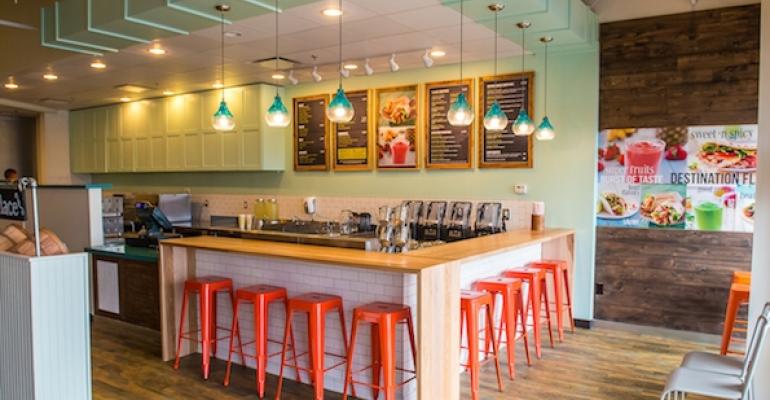BIP Capital has learned a lot about the franchise business since investing in Tropical Smoothie Cafe in 2010 and helping to turn it into one of the fastest growing franchise businesses in the country five years later.
Now it wants to teach those lessons to other franchise businesses.
The Atlanta-based investment fund has created the BIP Franchise Accelerator, with plans to make minority, venture capital investments in growth franchise concepts while instructing them on the finer lessons of building the business.
The primary lesson, said BIP vice president Tom Wells, is to quickly build out a franchise’s infrastructure to support future growth. BIP wants to invest in one franchise concept a year.

“When we purchased controlling interest in Tropical Smoothie, we over-invested in infrastructure,” Wells said. “We invested heavily in the brand. We developed a new prototype. Added technology to drive unit economics and tripled the corporate staff.”
BIP invested in Tropical Smoothie in 2010, when it had just more than 200 locations. It bought controlling interest in the chain two years later. This summer, the company opened its 500th location, and the chain expects to open 95 locations this year.
But even when BIP bought Tropical Smoothie in 2012, it had long term plans that went well beyond the smoothie concept. It wanted to use that chain to learn more about the franchise business so it could start the accelerator.
The idea is to make minority investments in growth franchise businesses, and then use the knowledge and experience from the executives at the much larger Tropical Smoothie to help those concepts take the next step.
“Franchisors need capital to build their infrastructure correctly,” Wells said. “With knowledge and expertise, they can do it with less capital over time. We can use what we learned at Tropical Smoothie with other franchises.”
Franchising is a popular business among investors, because it relies on capital from other people — franchisees — to build locations and enables a restaurant brand to expand rapidly.
But that doesn’t mean franchises don’t require capital spending. They do. The type of capital necessary for a franchise business to grow the right way is just different.
“People, when they think of franchising, they think of it as a capital efficient way to scale a concept quickly,” Wells said. “But it takes a lot of capital to grow a franchise the right way. It’s not light on infrastructure.”
The first concept in the accelerator is Tin Drum Café, the Asian concept that BIP bought in 2013. The company redesigned its prototype to make it more modern and then launched franchise sales — Tin Drum had never focused on franchising.
“We were able to leverage what we’ve done at Tropical Smoothie,” Wells said. “It wasn’t a long process. We could drop it in quickly.”
Wells noted that entrepreneurs build great concepts, but struggle once they get into the franchising end of the business.
“The challenge is selling franchises and dealing with franchisees’ challenges,” he said. “We can take a lot of that headache off the founder and let the founder focus on the product, consumer and the in-store experience.”
BIP hopes it can replicate the success of Tropical Smoothie, which was opening 25 units a year back in 2011 and expects to quadruple that number of openings this year. Wells also noted that average unit volumes over that time have grown by a third, to $634,000 per location.
Venture capital has traditionally shied away from the restaurant business, in part because of the heavy capital requirements of the business and the delayed gratification. As Wells noted, a technology business can ramp up far more quickly than a restaurant can, even one that grows quickly through franchising.
“It’s incredibly hard to scale a concept,” Wells said. “You’ve got to know branding, support, development, and you’ve got to understand how to operate a restaurant itself. And running a restaurant is one of the hardest things to do.”
But venture capital has made a bigger appearance in the sector in recent years as chains demonstrate they can provide early investors with super strong returns — thanks to the success of Chipotle Mexican Grill.
And Wells said that younger consumers are eager to try new things and to dine on cuisines that couldn’t see the light of day just a decade ago.
“It’s a market where new concepts can emerge pretty rapidly,” Wells said. “There are a lot more concepts geared toward Millennials. That aspect of the market is nice for new brands to come along.”
In addition, Wells said, technology is driving more improvements in the back of the house while driving more consumer interaction with brands — so customers can connect with brands more often and brands can drive more loyalty.
“And there are concepts in markets that never existed,” Wells said. “A national Indian chain or a Mediterranean chain was not on anybody’s radar five years ago. Consumers want to be more adventurous.”
And that, Wells said, makes the time right for something like the Franchise Accelerator.
“We saw a gap in the market,” Wells said. “We’re able to make minority stakes in franchise businesses and help the entrepreneur grow. We love helping entrepreneurs scale their business.”
Contact Jonathan Maze at [email protected]
Follow him on Twitter at @jonathanmaze

